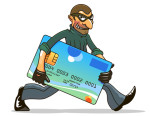 For the 13th consecutive year, identity theft continues to be the number one consumer complaint according to the Federal Trade Commission (FTC). Unfortunately identity thieves are becoming more and more sophisticated in the devices they use to steal our identities
For the 13th consecutive year, identity theft continues to be the number one consumer complaint according to the Federal Trade Commission (FTC). Unfortunately identity thieves are becoming more and more sophisticated in the devices they use to steal our identities
One of the devices being used by identity thieves that has been in the news lately is known as a credit card skimmer. Basically a credit card skimmer is the device that is used to read the information on the credit card.
The credit card skimmer can either be a hand-held device, mounted to another device (i.e. ATM machine or fuel pump at a gas station, etc.) or even be a radio frequency (RFID) reading device. Let’s take a quick look at each one of these.
Hand-held devices – These are also known as credit card wedges. They vary in size and usually are connected to a computer or another device that will use the information read to process the credit card transaction. However, some of these hand-held devices have the ability to store the credit card/debit card information internally giving the ability to download the data later. Now days there are devices that can be attached to a smart phone, tablet or portable computer that can read the credit card information.
Many times this is the device used by employees, waiters or other identity thieves to quickly capture credit card information while they are performing their normal duties or activities.
Mounted credit card readers – Theses credit card skimmer devices are mounted on top of or in place of the normal credit card reader. These are usually placed on bank ATM machines, or fuel station pumps. Identity thieves uses these devices to read the credit/debit card information then watch the users while they are entering their personal identification number (PIN number) using hidden cameras, binoculars or other long-range surveillance devices.
I recently read an article where they caught an identity thief that had placed a skimmer at a gas station. The identity thief placed the skimmer on the fuel pump then rented out a hotel room overlooking the gas station. There he setup a high power scope where he could view and make note of the PIN’s as they were being entered. He would then retrieve the credit/debit card information from the skimmer and be able to access the accounts or sell the account information.
Radio Frequency reader (RFID) – Take a look at your credit card. If it says RFID “Paypass”, has the triangle of nested arches or if you see a RFID chip then this section is for you. The RFID credit cards are being marketed by the financial institutions to “make things easier for the consumer”. Using one of these will allow you to speed up the purchase by simply waiving over or tapping the card on a radio frequency device reader. What you might not know is that anyone with a RFID sniffer/reader can also read the credit card information even if it is still in your pocket, purse or wallet if they get close enough to pick up the signal. That means you could be in the checkout line to make a purchase, walking down the street, on the bus or train, just about anywhere, someone could be collecting your credit card information without you ever knowing it.
Please note that a lot of passports now days have incorporated an RFID chip allowing your passport information to be read by a RFID sniffer as well.
Here are some simple steps to avoid being a victim of credit card skimming:
- When using your credit/debit card, using it as a credit card instead of a debit card could avoid you from exposing your PIN number.
- Use cash when it is practical to do so.
- Cover the keypad when entering your PIN number. You never know who is watching you.
- Before you insert your credit/debit card into a reader, inspect it. If it looks suspicious, don’t use it.
- Check your account balances frequently and notify the bank or credit card company as soon as you see any suspicious activity.
- If you have a RFID card or passport, protect it by wrapping it in aluminum foil paper or use a radio frequency blocking device. Click here for more information.
- Change your PIN number periodically.
- Don’t use the same PIN number for all of your accounts.
- If you are a victim, file a police report and complaint with the Federal Trade Commission (FTC). The information you provide might help to catch the identity thief.
- Check your credit file frequently.






